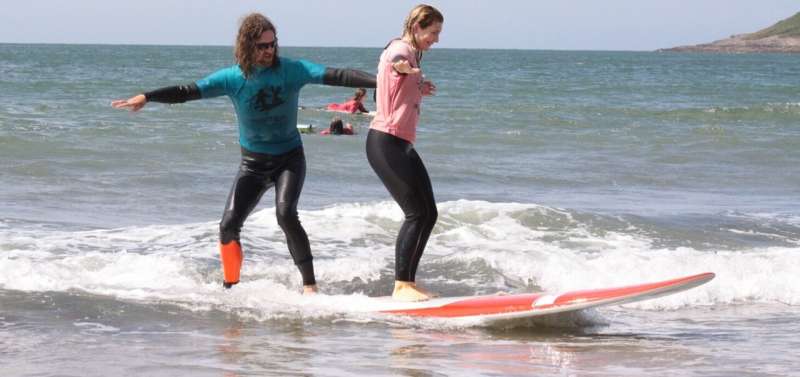Surfability lead director and head coach Ben Clifford with Lowri Wilkie, a member of the research team, at Caswell Bay. Credit: Swansea University
Generations of surfers know there's nothing like catching the perfect wave, but now new research has looked at just how beneficial the power of the sea can be.
The Swansea University study examined how a group of adults living with the consequences of acquired brain injury benefited from group-based surf therapy on the Gower coast.
Lead researcher final year Ph.D. student Katie Gibbs said: "Nature has long demonstrated the capacity to facilitate well-being. Increasingly interventions involving the natural environment are used to help aspects of well-being in clinical populations.
"But we wanted to find out how nature-based interventions such as surf therapy could be used when it comes to promoting well-being in the context of neurorehabilitation."
Katie and her colleagues from the School of Psychology interviewed 15 adults with acquired brain injury following a five-week intervention where they worked with Surfability UK, a Gower-based community interest company which specializes in providing surfing experiences for people with additional needs.
Their findings have just been published in the online journal PLOS ONE.
Scientists at the University have been collaborating closely with clinicians from Swansea Bay University Health Board and Hywel Dda University Health Board to re-examine our way of thinking about health and well-being and consider how these insights could be used to support people living with pervasive impairment after stroke or acquired brain injury.
Katie said: "We know physical health and psychological well-being are influenced by many things including healthy eating, sleeping well, or physical exercise. But our health and well-being are also influenced by whether we gain a sense of meaning, purpose, and achievement in our lives; whether we have a sense of belonging and it can even be dependent upon how connected we feel to our natural environments."
One group which often struggles to experience various determinants of well-being are people with acquired brain injury. In addition to having emotional, cognitive, and physical difficulties, many feel isolated and unable to reintegrate into their communities.
A majority of stroke and brain injury survivors have difficulty returning to work or engaging in the leisure activities they once enjoyed, which in turn means opportunities for social connection, joy, meaning, and purpose are limited.
To address this, clinicians looked for diverse ways to give people with stroke and brain injury opportunities to experience well-being in their local and natural environments. This resulted in the partnership with Surfability UK, whose work offering surfing experiences at Caswell Bay led to it being featured on BBC1's DIY SOS.
Since teaming up around three years ago, up to 50 stroke and brain injury survivors have enjoyed two-hour surfing session for up to five-week periods.
In interviews conducted with 15 of those individuals, Katie and the team learned just how life-changing the experience had been.
She said: "Over and above everything else we found surfing nourished the belief that despite 'being a bit broken in some places' participants could experience well-being.
"Many said their experience gave them a 'valid reason for being alive.'"
The research looked at the positive changes the participants experienced over those five weeks and beyond, where they enjoyed the benefits of being in nature and connecting to the present moment in a safe and supportive environment.
The group activity also meant they could connect with similar others, gaining a sense of belonging and community that they struggled to experience elsewhere. Within this community they began to reappraise themselves and what they were capable of, with help from the clinicians who worked with them to set meaningful goals.
Katie added: "Our themes capture how immersing individuals in natural environments can provide the context for stroke and brain injury survivors to experience various pillars of well-being which they are often sorely lacking in."
For her research, Katie has been working with Professor Andrew Kemp and Dr. Zoe Fisher who have previously published research on the importance of taking a wider approach to well-being and considering how it can be influenced by the surroundings within which we live.
More information: Katie Gibbs et al, Riding the wave into wellbeing: A qualitative evaluation of surf therapy for individuals living with acquired brain injury, PLOS ONE (2022). DOI: 10.1371/journal.pone.0266388
Journal information: PLoS ONE
Provided by Swansea University
























